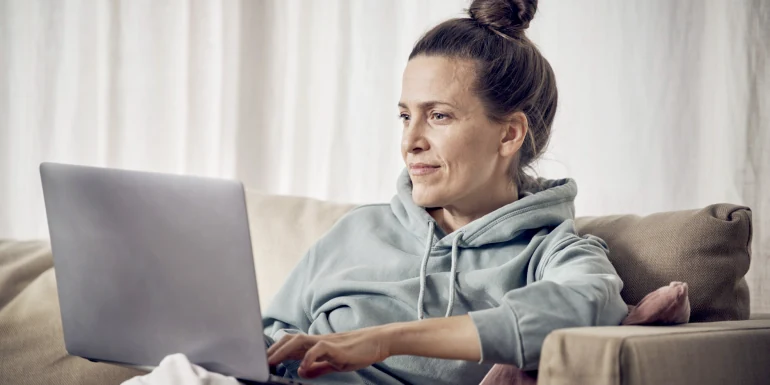
How do glasses with a blue light filter help?
Smartphones, laptops and TVs give off a lot of blue light, which disturbs our sleep-wake cycle. Glasses with a blue light filter reflect the blue light or weaken it. But does this actually improve our sleep?
Nowadays, we spend more time in front of blue light than ever before. This is largely down to the fact that LED lights and the screens on digital devices give off a lot of blue light.
Blue light changes the metabolism of the retina and damages it. However, scientists still can’t determine the amount and which sources of light are especially dangerous.
All colours have a different wavelength and energy. A short wavelength is more dangerous to humans than a long wavelength. Blue light has a lot of energy and a short wavelength. It is 380 to 500 nanometres. The only thing that is more damaging is ultraviolet light.
Blue light also changes our body clock. It can lead to our body producing less melatonin, a sleep hormone. If you stare at a screen for a long time before going to bed, it influences the quality of your sleep. Analyses in sleep laboratories have shown that spending a long time looking at a screen before going to bed can lead to it taking longer to fall asleep.
How do glasses with a blue light filter work?
The principle of a blue light filter is very similar to sunglasses. While sunglasses protect you against UV rays, glasses with a blue light filter are said to reflect blue light. There are two options to choose from.
- Yellow-orange-coloured sunglasses with a blue light filter greatly weaken the blue parts of light from a certain wavelength. They are often used in ski goggles, for example.
- Glasses with a tint of around 10 percent reflect part of the blue part of the light. They are ideal for everyday life.
The glasses are also available with and without prescription lenses. The filter cannot be applied to the lenses after you have bought them. You have to decide if you want the filter when you purchase them.
You can wear glasses with a blue light filter in your everyday life. When driving at night, the glasses can even help you to see the environment better, as they increase contrast and reduce glare.
Find out more about cataracts, glaucoma, glasses and contact lenses, laser eye surgery and our insured benefits here
Who are glasses with a blue light filter suitable for?
You should consider wearing glasses with a blue light filter if one of the following points applies to you:
- You spend several hours a day in front of a screen.
- You often spend time on your mobile phone or watch TV in the evening.
- Your eyes often hurt or you have headaches when working on the computer for long periods of time.
- Your eyes are sensitive to light.
- You regularly drive at night.
Do glasses with a blue light filter really improve sleep quality?
Researchers still don’t agree on the effects that glasses with a blue light filter have on your sleep. A few studies confirm its efficacy, others contradict it.
What alternatives to glasses with a blue light filter are available?
Going for a walk helps to keep your body in check with its natural day-night rhythm. Turn off all digital devices two hours before you go to bed, or switch on the integrated blue light filter or night mode. Find out more in our blog post about screen time.

The expert provided the editorial team with advice and input for this article. Julia Pieh (doctorate in pharmacy and toxicology, pharmacist, naturopath) works in the Helsana Health Consultation Service.

Newsletter
Find out more about current health issues every month and get all the information you need about our attractive offers from all Helsana Group companies * delivered by e-mail to read whenever it suits you. Our newsletter is free of charge and you can sign up here:
We did not receive your information. Please try again later.
* The Helsana Group comprises Helsana Insurance Company Ltd, Helsana Supplementary Insurances Ltd and Helsana Accidents Ltd.